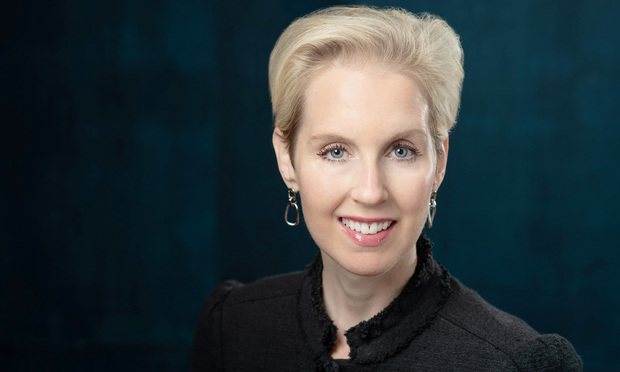State Plan Changes Seek to Help Children Get Health Insurance
The state Agency for Health Care Administration wants $16.3 million to help insure an additional 22,000 children in the Florida Healthy Kids program and lower the costs for some children already in the program, according to a legislative budget request.
December 17, 2018 at 11:49 AM
4 minute read
 Rebecca Matthews, CEO with Florida Healthy Kids/courtesy photo
Rebecca Matthews, CEO with Florida Healthy Kids/courtesy photo
Florida may have a plan to address the increasing number of children who lack health insurance, but it remains to be seen whether the proposal will get funded.
The state Agency for Health Care Administration wants $16.3 million to help insure an additional 22,000 children in the Florida Healthy Kids program and lower the costs for some children already in the program, according to a legislative budget request.
Florida officials hope to use the money to take advantage of a federal change that allows the state to return the program to its pre-Obamacare days. Though mostly administrative in nature, Florida Healthy Kids Chief Executive Officer Rebecca Matthews said the moves would lower premiums to $170 a month for so-called full-pay children, which could attract more children to the program.
But House Speaker Jose Oliva is frustrated by the amount of money taxpayers spend on health care and has made lowering costs a top priority. While he says he's troubled by the rise in the uninsured rates, he may nevertheless be hesitant to approve increased funding.
“To say 'I'm troubled by it, I'll dump a whole bunch more money in it,' is to say, 'The next presiding officers will then have to come back and try to figure it out because the prices will continue to rise,'” Oliva told The News Service of Florida last month.
The legislative budget request comes on the heels of a Georgetown University Center for Children and Families report this month that showed about 325,000 uninsured children in Florida in 2017, up from 288,000 in 2016. That put Florida's overall uninsured rate for children at 7.3 percent.
It was the first time the percentage of uninsured children had increased in the last decade, according to the analysis.
Before the Affordable Care Act, better known as Obamacare, the Florida Healthy Kids program provided subsidized insurance coverage to low-income children ages 5 to 18 and access to managed-care plans with children-centric benefits. It also allowed children who lived in families that earn more than 200 percent of the federal poverty level to have access to the same plans, but their premiums weren't subsidized with federal funds.
All children enrolled in the program, regardless of their incomes, had access to the same managed-care plans.
After 2015, though, the state was required to revamp the program so full-pay children were offered Obamacare-compliant policies. The policies have different benefits and were subject to co-insurance requirements and deductibles.
As a result, full-pay enrollment in the program plummeted from a high of 36,000 to a low of 10,000 children in January 2017.
The Bipartisan Budget Act of 2018, though, exempts Florida Healthy Kids policies from the Obamacare requirements and allows states to again combine the programs. Though full-pay children wouldn't have their monthly premiums directly subsidized with federal funds, the children would be able to tap into the child-centric health coverage that the state was able to negotiate on behalf of children whose premiums are subsidized.
Matthews said including full-pay children in the same program — and insurance risk pool — as the other children will lower monthly premium costs from $245 to $170.
Matthews said she was lobbying the Legislature, the incoming DeSantis administration and Chief Financial Officer Jimmy Patronis, who makes appointments to the Florida Healthy Kids Corp. board of directors, on the funding request.
Matthews' lobbying appears to have had some success in the Senate, where Health and Human Services Appropriations Chairman Aaron Bean expressed support for the proposal last week.
“That's something in the future that we can look at as a committee going forward to make sure we are doing all we can do so that everybody has access to health insurance,” said Bean, R-Fernandina Beach.
Christine Sexton reports for the News Service of Florida.
This content has been archived. It is available through our partners, LexisNexis® and Bloomberg Law.
To view this content, please continue to their sites.
Not a Lexis Subscriber?
Subscribe Now
Not a Bloomberg Law Subscriber?
Subscribe Now
NOT FOR REPRINT
© 2025 ALM Global, LLC, All Rights Reserved. Request academic re-use from www.copyright.com. All other uses, submit a request to [email protected]. For more information visit Asset & Logo Licensing.
You Might Like
View All
Meta agrees to pay $25 million to settle lawsuit from Trump after Jan. 6 suspension
4 minute read
Executive Assistant, Alleging Pregnancy Discrimination and Retaliation, Sues Florida Healthcare Entrepreneur
3 minute read
Trending Stories
- 1Law Firms Expand Scope of Immigration Expertise, Amid Blitz of Trump Orders
- 2Latest Boutique Combination in Florida Continues Am Law 200 Merger Activity
- 3Sarno da Costa D’Aniello Maceri LLC Announces Addition of New Office in Eatontown, NJ, and Named Partner
- 4Friday Newspaper
- 5Public Notices/Calendars
Who Got The Work
J. Brugh Lower of Gibbons has entered an appearance for industrial equipment supplier Devco Corporation in a pending trademark infringement lawsuit. The suit, accusing the defendant of selling knock-off Graco products, was filed Dec. 18 in New Jersey District Court by Rivkin Radler on behalf of Graco Inc. and Graco Minnesota. The case, assigned to U.S. District Judge Zahid N. Quraishi, is 3:24-cv-11294, Graco Inc. et al v. Devco Corporation.
Who Got The Work
Rebecca Maller-Stein and Kent A. Yalowitz of Arnold & Porter Kaye Scholer have entered their appearances for Hanaco Venture Capital and its executives, Lior Prosor and David Frankel, in a pending securities lawsuit. The action, filed on Dec. 24 in New York Southern District Court by Zell, Aron & Co. on behalf of Goldeneye Advisors, accuses the defendants of negligently and fraudulently managing the plaintiff's $1 million investment. The case, assigned to U.S. District Judge Vernon S. Broderick, is 1:24-cv-09918, Goldeneye Advisors, LLC v. Hanaco Venture Capital, Ltd. et al.
Who Got The Work
Attorneys from A&O Shearman has stepped in as defense counsel for Toronto-Dominion Bank and other defendants in a pending securities class action. The suit, filed Dec. 11 in New York Southern District Court by Bleichmar Fonti & Auld, accuses the defendants of concealing the bank's 'pervasive' deficiencies in regards to its compliance with the Bank Secrecy Act and the quality of its anti-money laundering controls. The case, assigned to U.S. District Judge Arun Subramanian, is 1:24-cv-09445, Gonzalez v. The Toronto-Dominion Bank et al.
Who Got The Work
Crown Castle International, a Pennsylvania company providing shared communications infrastructure, has turned to Luke D. Wolf of Gordon Rees Scully Mansukhani to fend off a pending breach-of-contract lawsuit. The court action, filed Nov. 25 in Michigan Eastern District Court by Hooper Hathaway PC on behalf of The Town Residences LLC, accuses Crown Castle of failing to transfer approximately $30,000 in utility payments from T-Mobile in breach of a roof-top lease and assignment agreement. The case, assigned to U.S. District Judge Susan K. Declercq, is 2:24-cv-13131, The Town Residences LLC v. T-Mobile US, Inc. et al.
Who Got The Work
Wilfred P. Coronato and Daniel M. Schwartz of McCarter & English have stepped in as defense counsel to Electrolux Home Products Inc. in a pending product liability lawsuit. The court action, filed Nov. 26 in New York Eastern District Court by Poulos Lopiccolo PC and Nagel Rice LLP on behalf of David Stern, alleges that the defendant's refrigerators’ drawers and shelving repeatedly break and fall apart within months after purchase. The case, assigned to U.S. District Judge Joan M. Azrack, is 2:24-cv-08204, Stern v. Electrolux Home Products, Inc.
Featured Firms
Law Offices of Gary Martin Hays & Associates, P.C.
(470) 294-1674
Law Offices of Mark E. Salomone
(857) 444-6468
Smith & Hassler
(713) 739-1250







